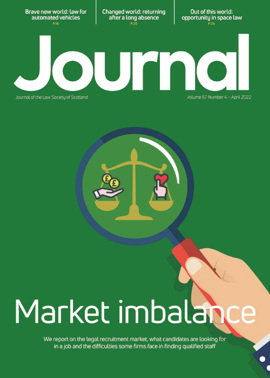Discipline cases: a three way balance
The rules of procedure in professional disciplinary cases are designed to ensure a fair balance between the interests of the regulated, the regulators and those who make complaints to regulators. Three recent decisions of the Scottish courts illustrate the importance of ensuring that all parties’ interests are appropriately protected.
Steele v Police Scotland [2022] CSIH 10
In this appeal, the Inner House considered the rationality of Police Scotland’s decision to invite the petitioner to a disciplinary meeting, as a result of conduct carried out on Twitter. During a fairly heated discussion with other Twitter users, relating to the death in custody of Sheku Bayoh, the petitioner had tweeted a GIF from the comedy film Napoleon Dynamite, depicting a man lightly tapping another man before running away.
Police Scotland raised disciplinary proceedings against the petitioner on the basis that the GIF could be interpreted as linking a light altercation to the allegations against the police in relation to the Sheku Bayoh case. The petitioner had sought judicial review of this decision and lost at first instance.
The Second Division refused the appeal. It considered that in order to be successful in challenging the proceedings at such an early stage (i.e. not challenging the result of the proceedings but merely the raising of them), the petitioner would have to demonstrate that on no objective view would he have a case to answer in terms of misconduct. This high test was not met. In the serious context of the discussions which were taking place, the use of a GIF from a comedy film could be viewed as inappropriate and Police Scotland were entitled to initiate disciplinary proceedings. The decision does not, of course, deal with the appropriateness of whatever disposal those proceedings may ultimately arrive at.
General Medical Council v MM [2022] CSOH 25
This case concerned a petition by the GMC to extend an interim suspension order put in place during the tenure of an investigation into a doctor. The interim suspension had initially been ordered by a Medical Practice Tribunal Service panel for a period of 18 months, and had been subject to a previous 12-month extension by the Court of Session. The GMC now sought a further extension of 12 months to allow it to conclude its investigations, which had been delayed both as a result of the pandemic and a parallel criminal investigation. The petition was opposed by the doctor on a number of grounds.
Lord Brailsford refused the prayer of the petition. In doing so, he considered that the GMC’s pleadings had identified and applied a lower test than that required by s 41A(1) of the Medical Act 1983. The GMC had proceeded on the basis that “There may be impairment of the respondent’s fitness to practise which may adversely affect the public interest.” The court considered that the correct test was in fact: “Whether public confidence in the medical profession is likely to be seriously damaged if the doctor continues to hold unrestricted registration during the relevant period”. Lord Brailsford concluded that it was tolerably clear that the test applied by the petitioner was a lower one than that set out in their own guidance on the statute and so refused the petition.
X v The Tribunal [2022] CSOH 15
This judicial review represented a slightly unusual circumstance. It functioned as an appeal against a decision of a “fitness for office” tribunal concerning a sheriff. However, the appeal was not made by the sheriff but by the complainer who had initially reported the allegations against the sheriff. The complainer, X, had alleged that the sheriff had acted inappropriately towards her. During a police investigation into those allegations, officers took statements from two other individuals, C1 and C2, who also alleged that the sheriff had acted inappropriately towards them prior to his appointment to the bench.
The statements of C1 and C2 were provided to the Judicial Office for Scotland’s investigating officer. The investigating officer did not speak to C1 and C2 and considered that their complaints fell outside the remit of his investigation, which was addressed to the allegations made by X. However, he acknowledged that they might become relevant to issues of credibility, should the sheriff attempt to put his good character in issue. For reasons that are not entirely clear, the statements were not available to the presenting officer who conducted the hearing.
X sought judicial review of the tribunal’s decision on the basis that there had been a breach of natural justice. She argued that the statements of C1 and C2 could have had a material effect on the outcome of the hearing and ought therefore to have been made available to the tribunal. Lord Woolman agreed with X’s submissions. He considered that, as a result of the exclusion of the statements (for whatever reason), the tribunal had proceeded without all the available evidence and X had not been given a “fair crack of the whip”. The decision of the tribunal was accordingly reduced.
Perspectives
Features
Briefings
- Criminal court: Thom bar still applies
- Licensing: tighter rules for the pet trade
- Insolvency: Transition from the COVID measures
- Tax: What did the Spring Statement bring?
- Immigration: Providing a home for Ukrainians
- Scottish Solicitors' Discipline Tribunal
- Property: RCI – what does it involve?
- In-house: Looking for a star







